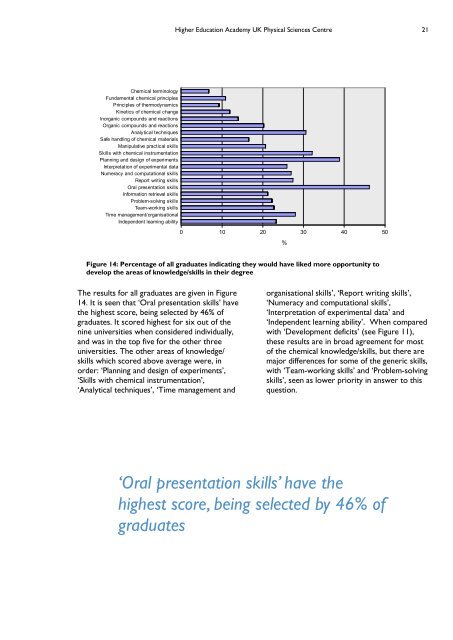Skills required by new chemistry graduates - Higher Education ...
Skills required by new chemistry graduates - Higher Education ...
Skills required by new chemistry graduates - Higher Education ...
You also want an ePaper? Increase the reach of your titles
YUMPU automatically turns print PDFs into web optimized ePapers that Google loves.
<strong>Higher</strong> <strong>Education</strong> Academy UK Physical Sciences Centre 21<br />
Chemical terminology<br />
Fundamental chemical principles<br />
Principles of thermodynamics<br />
Kinetics of chemical change<br />
Inorganic compounds and reactions<br />
Organic compounds and reactions<br />
Analytical techniques<br />
Safe handling of chemical materials<br />
Manipulative practical skills<br />
<strong>Skills</strong> with chemical instrumentation<br />
Planning and design of experiments<br />
Interpretation of experimental data<br />
Numeracy and computational skills<br />
Report writing skills<br />
Oral presentation skills<br />
Information retrieval skills<br />
Problemsolving skills<br />
Teamworking skills<br />
Time management/organisational<br />
Independent learning ability<br />
0 10 20 30 40 50<br />
%<br />
Figure 14: Percentage of all <strong>graduates</strong> indicating they would have liked more opportunity to<br />
develop the areas of knowledge/skills in their degree<br />
The results for all <strong>graduates</strong> are given in Figure<br />
14. It is seen that ‘Oral presentation skills’ have<br />
the highest score, being selected <strong>by</strong> 46% of<br />
<strong>graduates</strong>. It scored highest for six out of the<br />
nine universities when considered individually,<br />
and was in the top five for the other three<br />
universities. The other areas of knowledge/<br />
skills which scored above average were, in<br />
order: ‘Planning and design of experiments’,<br />
‘<strong>Skills</strong> with chemical instrumentation’,<br />
‘Analytical techniques’, ‘Time management and<br />
organisational skills’, ‘Report writing skills’,<br />
‘Numeracy and computational skills’,<br />
‘Interpretation of experimental data’ and<br />
‘Independent learning ability’. When compared<br />
with ‘Development deficits’ (see Figure 11),<br />
these results are in broad agreement for most<br />
of the chemical knowledge/skills, but there are<br />
major differences for some of the generic skills,<br />
with ‘Team-working skills’ and ‘Problem-solving<br />
skills’, seen as lower priority in answer to this<br />
question.<br />
‘Oral presentation skills’ have the<br />
highest score, being selected <strong>by</strong> 46% of<br />
<strong>graduates</strong>
















